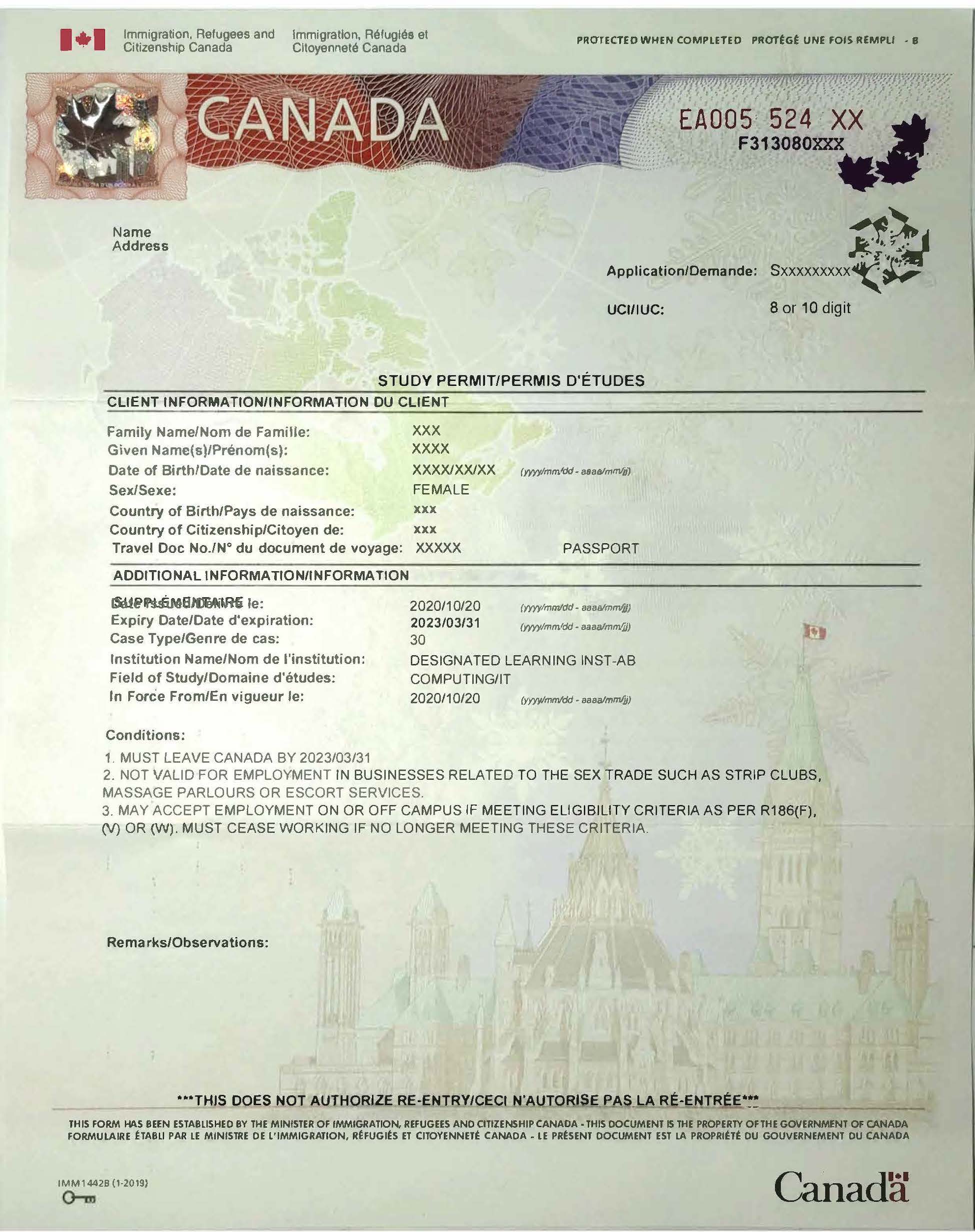A study permit is different from a temporary resident visa (TRV) and does not allow you to enter or re-enter Canada. To enter Canada, you also require a Temporary Resident Visa or Electronic Travel Authorization (eTA).
SAIT is a Designated Learning Institution recognized by the Alberta Government and Immigration, Refugees and Citizenship Canada (IRCC) DLI# O18761749692.
IRCC international student cap
Immigration, Refugees and Citizenship Canada's latest policy, announced in January 2024, may impact current and prospective international students at SAIT in relation to obtaining your study permit, open work permit or post-graduate work permit (PGWP).
How to apply for your study permit
Start your journey in Canada with SAIT and BorderPass
SAIT has partnered with BorderPass to offer all international applicants access to its premium Canadian immigration services.
BorderPass offers access to trusted immigration lawyers and legal services via a digital platform.
New applicants who have been accepted and received a Letter of Acceptance (LOA) and a Provincial Attestation Letter (PAL) can use this service to apply for their study permit.
Working with an agent
If you are working with an agent, visit our how-to guides for assistance.
How to apply for your initial study permit
Tips to avoid delays getting your study permit
✅ Apply online, using Borderpass or through a Visa Application Centre (VAC)
Visit the IRCC website to find the Canadian visa office that serves your country and learn of the application options available.
Consider using its services if a Visa Application Centre is located in your country.
✅ Apply early
The time it takes to process your application varies depending on the visa office where you applied. You can check average processing times online.
If you do not obtain a valid study permit before the beginning of the semester for which you have been accepted at SAIT, you may not be able to start your program.
✅ Ensure you have a valid passport
Make sure your passport is valid before you apply. If your passport is about to expire, we recommend you renew it before applying for your study permit.
✅ Get your medical exam
If you plan to participate in a work placement, co-op or practicum that will bring you close to patients, children, and the elderly, it’s best to complete your medical exam before you apply for your initial study permit and co-op work permit. Approved students will not have restrictive conditions on their permits.
To save time, you can do an upfront medical exam and include the exam confirmation receipt in your study and co-op work permit applications. You should also upload a Letter of Explanation into the "Client Information" section under optional Documents in your application to ask for your work permit to indicate that you may work in these occupations.
It’s also possible for you to take the medical exam after receiving the study or work permit and apply to change the conditions on the permits afterwards. It’s important to know that you cannot start the relevant positions until receiving a study or work permit with the appropriate conditions.
Visit the IRCC website to find approved panel physician.
Refer to IRCC' Medical exams for visitors, students and workers for more information.
✅ Get your biometrics
Please get your biometrics as soon as possible. Visit the IRCC website for more information.
✅ Double-check your documents
Submit all required documents and ensure that your documents are complete and correct.
Be sure to follow all instructions. If information is missing, your application will be returned.
Check the visa office that services your country to see if additional documents are required.
✅ Pay the proper fee
Failure to pay the correct fee, or not pay when required, can delay processing and/or result in a negative decision for your application.
What to expect after you apply for your study permit
 Once your study permit is approved, you will receive a Letter of Introduction from IRCC.
Once your study permit is approved, you will receive a Letter of Introduction from IRCC.
Usually, the letter contains the date you need to travel by, which is also your study permit validity date.
You will need to bring a copy of this letter when you travel, and the border officer will issue you your study permit upon your entry.
For some students who come from a visa-required country, you might receive a passport request letter in your account first, and you will need to mail your passport to a Visa Application Centre (VAC) and get your visa stamped on your passport.
You can book your travel once you receive your Letter of Introduction. Please have the following documents prepared and bring them on board with you:
- Your Passport
- Letter of Introduction from IRCC
- Letter of Acceptance from SAIT
- Proof of funds
- Valid medical exam receipt (if applicable)
- English test result (if applicable)
You will be issued your study permit at the border. Please check your study permit for accuracy before you leave the border.
Frequently asked questions
Studying part-time during the academic semester means that you are no longer eligible to work (if you were previously).
Part-time studies can also affect your eligibility to apply for a post-graduation work permit upon completing your program. If you are considering studying part-time, please visit the International Centre to meet with an advisor first.
The Canadian government mandates that international students should actively and continuously pursue their studies. A gap in studies (not including your scheduled break) can impact your eligibility to work while studying and your eligibility to apply for a post-graduation work permit.
If you are considering taking a leave in your studies, please meet with an advisor first.
The answer depends on which situation applies to you.
If you applied to extend your study permit before it expired, you now have "maintained status." This means that you can continue to live and study in Canada (and continue working if you meet eligibility requirements) until a decision is made on your extension application.
If you plan on leaving Canada while on implied status, please review the Government of Canada guidelines on implied status as a temporary resident.
If you did not apply to extend your study permit before it expired, you do not have implied status and are now out of status.
You will need to stop studying (and working) immediately and will need to apply to restore your status. Please visit the International Centre to talk with an advisor if this happens.
No. Once you receive your extended study permit, you can apply for a new TRV if required in your country.
Your family member’s immigration status won't be extended automatically, and your study permit extension will not be extended if no application is submitted for them.
You could choose to include your family members’ immigration application in your study permit extension in the same application package when you take the IRCC eligibility test, or they could apply for an extension separately.
Yes. You can visit a registry office to extend your Albert Health Care coverage and a Service Canada location to extend your SIN. Coverage duration is tied to the validity of your study permit.
If you lose your study permit (or co-op work permit), you will need to request a replacement from IRCC as soon as possible. To do so, please follow the steps to submit an Application for Replacement of an Immigration Document.
We recommend always keeping a photocopy of your immigration documents and passport.
If you are eligible to work under your study permit, and you find your study permit doesn't have the conditions or remarks printed with the wording: "may work" or "may accept employment." You need to amend your study permit before you can work in Canada. There's no cost to this application.
Suppose you weren't previously eligible to work off-campus, but now you have changed to a program that allows you to work off-campus; for example, you completed an English or Upgrading program and are now starting a diploma, degree or certificate program. In that case, you can apply to change the conditions of your study permit. You can apply to change the conditions of your study permit online from within Canada. This process is the same as extending your study permit, costing $150.
Contact us
International Centre
AA206, Heritage Hall, SAIT Main Campus
-
Phone - 1.403.284.8852
-
Email - international@sait.ca
-
Monday - Friday | 8 am - 4:30 pm MST

Oki, Âba wathtech, Danit'ada, Tawnshi, Hello.
SAIT is located on the traditional territories of the Niitsitapi (Blackfoot) and the people of Treaty 7 which includes the Siksika, the Piikani, the Kainai, the Tsuut’ina and the Îyârhe Nakoda of Bearspaw, Chiniki and Goodstoney.
We are situated in an area the Blackfoot tribes traditionally called Moh’kinsstis, where the Bow River meets the Elbow River. We now call it the city of Calgary, which is also home to the Métis Nation of Alberta.
